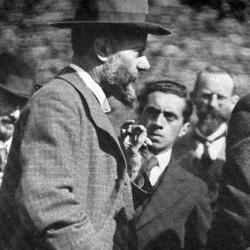Robert Scribner doesn’t think Protestantism “disenchanted” the world. Reformers did attack certain forms of medieval “magic.” They rejected “sacramentals,” which were “functional” rituals that could be used as protection against devils.
This didn’t produce a “buffered” world, impervious to outside influence. No one surpassed Luther in his obsession with demonic activity, rituals weren’t done away with (though Protestants had a different understanding of ritual from Catholics), and the world was still seen as the arena of God’s presence and activity. Protestants even developed their own Protestant superstitions—using Bibles, hymnals, and prayer books for healing and protection. If there was a change, it was that Protestants didn’t think they could control the “seepage” of sacred into the secular; the intrusions from outside were as unpredictable and uncontrollable as you’d expect a sovereign God to be.
Scribner sees typically nineteenth-century obsessions in Weber’s thesis, and argues that the theory, useful as it may be, didn’t arise from historical study and can’t withstand historical scrutiny: “The notion of the ‘Protestant ethic’ was an insight Weber arrived at less from historical research and more from observations of nineteenth-century Protestant behavior, which he then projected backwards in time in a classic example of the ‘regressive method.’ The further assumption that an adequate understanding of ‘Protestantism’ was achieved by focusing primarily on the theology of the main reformers, was a crucial next step, so that he did not have to confront the problem of the actual historicity of Protestantism, or the untidiness of the phenomenon as it was put into practice. It was sufficient to find examples to illustrate his ideal typical construction, drawn (as has often been remarked) rather indiscriminately from several way stations along the road from Luther to Weber’s own” (493).
An oddly idealist method for a sociologist, that.
(Scribner, “The Reformation, Popular Magic, and the “Disenchantment of the World,” The Journal of Interdisciplinary History, 23:3 [Winter, 1993]: 475–494.)














